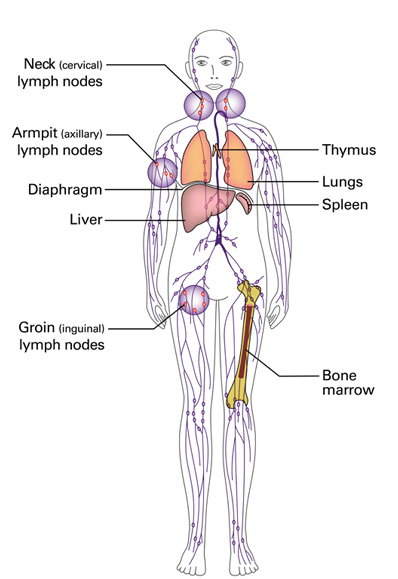|
Lymphoma is the fifth most common type of cancer in the India. It can occur at any age, even in children. It is nearly always treatable; most people live for many years after being diagnosed with lymphoma.
What is cancer?
Your body is made up of many different types of cell, eg skin, bone and blood cells, among others. Your cells grow and divide to form new cells. These new cells replace cells that have grown old or become damaged and died. Cell division and cell death are normal processes that occur in your body. These processes are controlled by chemical signals.
Cancer can develop if cells have mutations (changes in their genes) that mean they stop ‘listening’ to control signals. The cells may then start to divide in an abnormal way, or they may not die when they should. This breakdown in control lets abnormal cells build up and form a cancer. In cancer, the abnormal cells are ‘malignant’, meaning they can spread to other parts of the body and start growing there too.
In cancer, your body makes abnormal cells, which may stop you from making normal, healthy cells. This is dangerous because it can prevent organs from working properly. Cancer also uses up the energy and nutrients needed by your body. There are many different types of cancer and each can have different effects.
Some types of cancer, eg breast cancer, are well known. Other types, such as lymphoma, are less well known. Many people diagnosed with lymphoma had never heard of the disease.

What is lymphoma?
Lymphoma occurs when lymphocytes (white blood cells that help to fight infection) become out of control. They divide in an abnormal way or do not die when they should.
Healthy lymphocytes travel around your body in your lymphatic system, which is part of your immune system. The lymphatic system runs throughout your body and includes lymph nodes (glands) as well as organs of your immune system like your thymus and your spleen. Lymphocytes collect in your lymph nodes ready to fight infection. Lymph nodes are found throughout your body, often in groups.
 |
If you have lymphoma, abnormal lymphocytes can collect in your lymph nodes, often in your armpits, neck or groin. However, abnormal lymphocytes can collect in almost any part of your body. They might be found in lymph nodes deeper in your body or in other parts of your lymphatic system, like your spleen. Less commonly, lymphoma can be extranodal, which means it starts in areas outside of the lymphatic system. These areas can include your lungs, liver or bones |
What symptoms of lymphoma?
You have depends on where the lymphoma starts and what parts of your body it affects. Like any cancer, lymphoma can affect the function of the tissue involved. For example, if it affects your lungs, you might have a cough or shortness of breath.
There are many different types of lymphoma which can behave differently and need different treatment. |